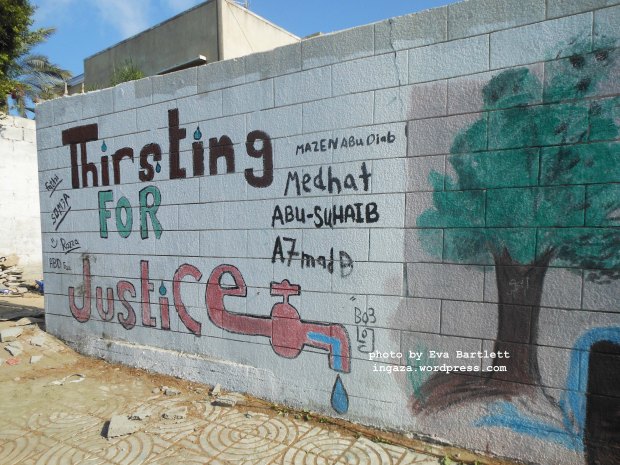Imperialism and water in Palestine
Human need for water is a weapon in the service of imperialism and settler colonialism. Water can be not just a commodity, but a means of ethnic cleansing. In occupied Palestine, Israel-as-oasis is a prominent part of the state’s national mythology. The military occupation, expanding illegal settlements and apartheid are accompanied by assertions that Israel has brought life – human, animal and plant – to what was a barren, inhospitable landscape. Desolate-looking Palestinian villages are contrasted to thriving, green Israeli settlements.
Halamish, an Israeli settlement in the occupied West Bank, sits above the Palestinian village of Nabi Saleh. In the documentary Thank God It’s Friday, a Halamish resident is filmed watering her garden while boasting, “There were no birds before we came”. In reality, it’s through violent dispossession – of houses, land, resources and life – that every Israeli settlement is built, and water theft has played a key role in that dispossession. When Palestinians had access to water, their agricultural communities thrived. Israel forced Palestinians off the arable land and took it under Israeli control. Palestinian access to water is increasingly restricted as settlements continue to be built on freshly stolen land.
In Nabi Saleh, residents receive 12 hours of running water a week. In Halamish it’s provided 24 hours a day. A huge pool sits as a centrepiece in the settlement, probably filled with water from the village’s water spring that was confiscated for use by the settlement in 2009.
Nabi Saleh is under constant siege by the Israeli military, which raids homes, murders civilians and destroys water tanks on the villagers’ roofs. With villagers forced off their land to make way for the Halamish settlement, and with their water spring confiscated, the targeting of water tanks ensures that they are reliant on water provided by the Israeli state.
The village and settlement are located within Area C of the West Bank. An Al Jazeera article outlined Israel’s strategy in the area: “The lack of water and other basic services resulting from Israeli policies has created a coercive environment that often leaves Palestinians with no choice but to leave their communities in Area C, allowing Israel’s land takeover and further expansion of its settlements”.
But it’s not just Area C. Since Israel occupied the West Bank in 1967, it has instituted water-sharing agreements that force all Palestinians in the region into dependence on Israel. Palestinians have refused to sit on the Joint Water Committee – within which Israel has a veto – since 2010. Water control is a key part of Israel’s ongoing process of dispossession: hence the myth of Palestine as a water-scarce region. The West Bank is not naturally short of water. It’s bordered by the Jordan River and sits above the Mountain Aquifer. United Nations data show that Ramallah gets more rainfall than London. But Israel’s policies ensure that it’s siphoned away from Palestinians.
And it’s not just the West Bank. The 2 million Palestinians living in Gaza, the world’s biggest open-air prison, have access to virtually nothing that is not provided by Israel. The United Nations has predicted Gaza could be uninhabitable by 2020, partly due to its water crisis.
There is nothing accidental about that crisis. Where the needs of capitalism are met through imperialism and ethnic cleansing, places like Palestine are made deserts.
Read part of the article by Meg Hill that considers the alleged water situation for Palestine in Red Flag.

